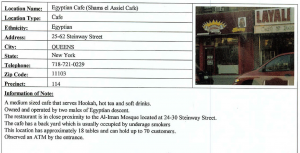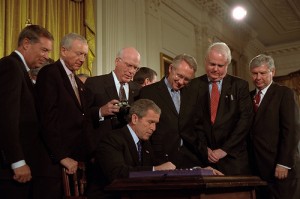Most sane people are outraged by the WSJ’s hacktalicious editorial calling for calm on the hack scandal.
As well they should: the editorial discredits WSJ as a paper.
But I was particularly interested in this bit.
In braying for politicians to take down Mr. Murdoch and News Corp., our media colleagues might also stop to ask about possible precedents. The political mob has been quick to call for a criminal probe into whether News Corp. executives violated the U.S. Foreign Corrupt Practices Act with payments to British security or government officials in return for information used in news stories. Attorney General Eric Holder quickly obliged last week, without so much as a fare-thee-well to the First Amendment.
The foreign-bribery law has historically been enforced against companies attempting to obtain or retain government business. But U.S. officials have been attempting to extend their enforcement to include any payments that have nothing to do with foreign government procurement. This includes a case against a company that paid Haitian customs officials to let its goods pass through its notoriously inefficient docks, and the drug company Schering-Plough for contributions to a charitable foundation in Poland.
Applying this standard to British tabloids could turn payments made as part of traditional news-gathering into criminal acts. The Wall Street Journal doesn’t pay sources for information, but the practice is common elsewhere in the press, including in the U.S.
The last time the liberal press demanded a media prosecutor, it was to probe the late conservative columnist Robert Novak in pursuit of White House aide Scooter Libby. But the effort soon engulfed a reporter for the New York Times, which had led the posse to hang Novak and his sources. Do our media brethren really want to invite Congress and prosecutors to regulate how journalists gather the news?
This is structured as an appeal to other media outlets, warning them that if they pile on, it might well hurt them too (this structure continues to the rest of the editorial).
This argument ends with the Scooter Libby argument–the claim that the NYT, because it purportedly “led the posse to hang [Bob] Novak and his sources” (including, among others, Dick Cheney and Scooter Libby), ended up getting embroiled in the Libby case (in spite of the fact that NYT discredited itself by protecting Libby for a year after they had published his name as Judy’s source).
Fair enough. The NYT–and especially Judy Miller–was exposed to be as hackish as Novak was (and, as another outlet who published bogus leaks in the Joe Wilson pushback, the WSJ) when its laundering of government leaks was made clear.
So the WSJ is rightly reminding other media outlets that they are as hackish as it is. Perhaps they have specific incidents of hackishness in mind? Maybe the rest of the press should worry that a focus on how corrupt our press has gotten will reflect badly on them too. It appears, for example, that the WaPo is worried about just such a thing.
Then, oddly (working backwards from the Judy Miller issue), the WSJ warns that if other media outlets pile on, it’ll criminalize payments made in the course of news-gathering–with a claim that such a horror would only matter for British tabloids. Only, that’s not exactly true, is it? And that’s before you consider the number of “consultants” TV stations pay for their “expertise.”
Then, in the first part of this passage, the WSJ rails against what is probably one of its biggest worries–it’ll be held liable in the US for the fairly well-established bribery it engaged in in the UK (even assuming no such bribery were discovered here in the US). It suggests that a poor helpless media company would never bribe a government for something real–like a contract. Putting aside the appearance that Murdoch’s minions bribed the cops.
Except at the heart of this scandal is Murdoch’s attempt to get full control of BSkyB. Not to mention Murdoch’s fairly well-established pattern of trading political support for Tony Blair, Hillary Clinton, and David Cameron in exchange for political favors.
This is bribery every bit as much as Halliburton’s bribery to get Nigerian contracts was bribery. A satellite concession is every bit as tangible a goal as is a contract. But it attempts to couch decades of Murdoch’s ruthless business practices in First Amendment hand-wringing. It suggests that whatever meager journalism Murdoch’s minions do, it should excuse his illegal business practices.
This WSJ editorial is a damning exhibit in outright hackery.
But I suspect its audience–other hackish media outlets–finds it a persuasive read.
Update: With this editorial in mind, I wanted to point to a few paragraphs of Alan Rusbridger’s description of how the Guardian broke this story. A key part of it, he describes, was in partnering with the NYT to break the omertà among British papers.
Big story? Not at all. Not a single paper other than The Guardian noted [a $1 million settlement against News of the World for bullying] in their news pages the next day. There seemed to be some omertà principle at work that meant that not a single other national newspaper thought this could possibly be worth an inch of newsprint.
Life was getting a bit lonely at The Guardian. Nick Davies had been alerted that Brooks had told colleagues that the story was going to end with “Alan Rusbridger on his knees, begging for mercy.” “They would have destroyed us,” Davies said on a Guardian podcast last week. “If they could have done, they would have shut down The Guardian.”
If the majority of Fleet Street was going to turn a blind eye, I thought I’d better try elsewhere to stop the story from dying on its feet, except in the incremental stories that Nick was still remorselessly producing for our own pages. I called Bill Keller at The New York Times. Within a few days, three Times reporters were sitting in a rather charmless Guardian meeting room as Davies did his best to coach them in the basics of the story that had taken him years to tease out of numerous reporters, lawyers, and police officers.
The Times reporters took their time—months of exceptional and painstaking work that established the truth of everything Nick had written—and broke new territory of their own. They coaxed one or two sources to go on the record. The story led to another halfhearted police inquiry that went nowhere. But the fact and solidity of the Times investigation gave courage to others. Broadcasters began dipping their toes in the story. One of the two victims began lawsuits. Vanity Fair weighed in. The Financial Times and The Independent chipped away in the background. A wider group of people began to believe that maybe, just maybe, there was something in this after all. [my emphasis]
News Corp would have destroyed the Guardian, Rusbridger and Nick Davies say, if they had had the dirt to do so. Such threats are presumably how News Corp enforced the omertà on the story.
Now look at the editorial. It appears, first of all, to be an appeal to precedent–a similar kind of appeal often made when pointing out that an espionage prosecution of Julian Assange will criminalize newsgathering.
It argues that a prosecution of News Corp under the FCPA would be a bad precedent, equating contracts with–well, I”m not sure what News Corp is admitting to here, as its media interests do amount to a contract. It then suggests–the logic is faulty–that such a prosecution would also criminalize the news gathering of those who pay for stories. This seems to be an implicit threat directed at those who do pay for stories (note that this editorial doesn’t say News Corp, including Fox TV, doesn’t pay for stories, just WSJ), perhaps an attempt to silence TV news.
But then, after having already impugned newspapers that, like the Guardian and NYT, gave “their moral imprimatur” to WikiLeaks, the editorial levels a threat clearly directed at the NYT, noting how the the newspaper’s purported efforts to go after Novak’s sources ended up backfiring on the NYT.
Not long after Rusbridger described the omertà that helped News Corp forestall consequences in the UK, Murdoch’s mouthpiece here in the US issued a veiled threat against the NYT.
I’m betting that Murdoch thinks the NYT will be easier to destroy than the Guardian.


